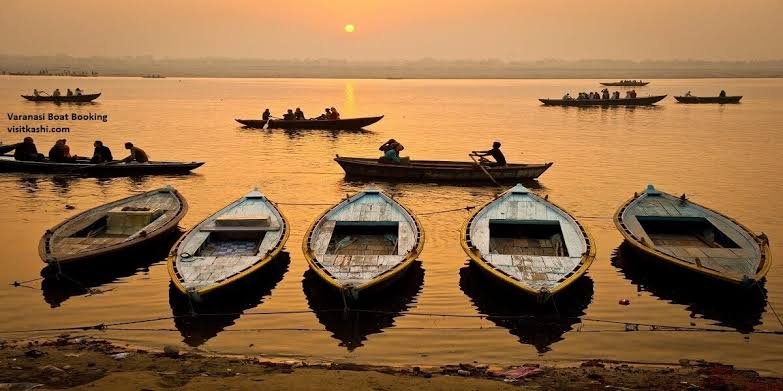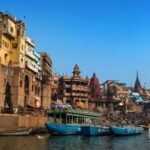Tourists Are Disappointed by Varanasi’s Total Boat Service Shutdown, As Boatmen Demonstrate Against Administrative Measures
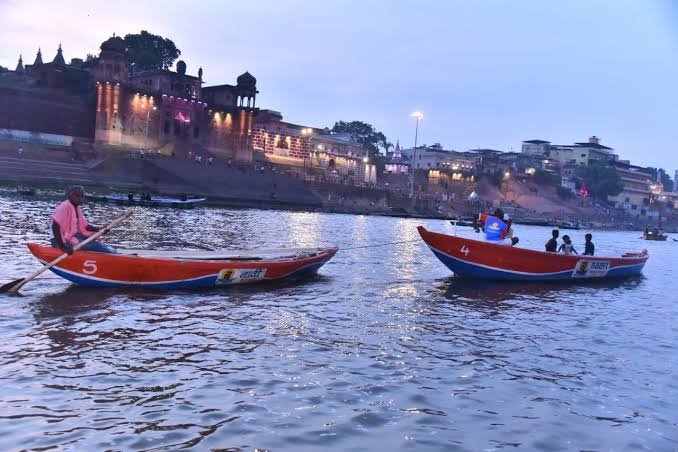
Boatmen have chosen to discontinue services permanently, bringing the Ganges to a total halt in Varanasi, India’s spiritual capital. Normally crowded with tourists taking boat rides, the Kashi ghats now feature an uncommon sight: long lines of empty boats lining the riverside. Tourists are unhappy by the boatmen’s choice since it prevents them from enjoying the expansive vistas of the city’s famous ghats from the river.
The Justification for the Protest
This action was done by Varanasi boatmen in reaction to what they claim is administrative negligence and police harassment. The imprisonment of boatmen, strict overloading laws, and improper licensing for the previous two years were among the many issues that led to the protest.
When a number of boatmen were supposedly arrested for breaking the rules, the atmosphere became more heated. The community is calling for the lifting of the limitations they believe to be unjust and their immediate release. The district administration, police, and local officials have all tried to negotiate, but the talks have not produced any fruitful outcomes.
Effect on Travel
For tourists who come to Varanasi to take in the captivating boat rides along the Ganges, particularly at sunrise and sunset, the lack of boat services is a significant setback. Due to their inability to participate in this traditional Varanasi event, many tourists, both domestic and foreign, had to leave dejected. There were few possibilities for those who had centered their schedules around boat rides to explore the ghats.
Boat rides are a crucial component of the pilgrimage and tourism itineraries of the more than a million visitors who come to Varanasi each year. Both the local businesses that depend on the tourists and the tourists themselves have been affected by the inconvenience. The daily profits of hotels, tour guides, and souvenir vendors along the ghats have decreased. The ongoing strike is also hurting local vendors and rickshaw pullers who depend on tourists for their livelihood.
Requests of Boatmen
Encouraged Manjhi, who is spearheading the demonstration under the Maa Ganga Nishadraj Seva Nyas banner, has listed a number of important demands:
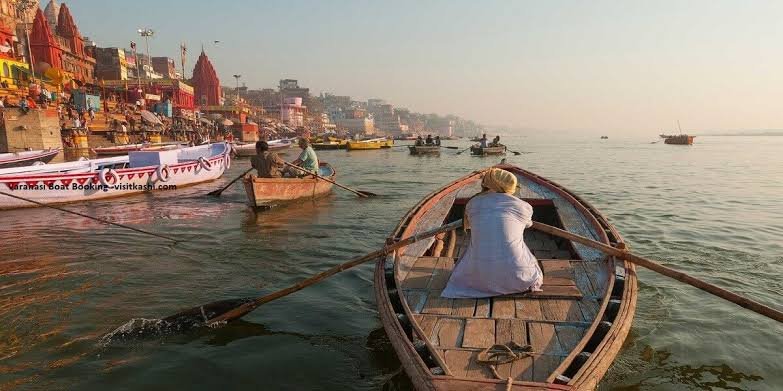
- The immediate release of boatmen who have been arrested.
- The two-year-delayed issuance of outstanding boat licenses.
- Alleged harassment must end in accordance with overloaded regulations.
- Boats seized for overloading offenses are returned.
- To avoid future disputes, government and boat operators should communicate clearly and openly.
The protesting boatmen contend that by offering life jackets, they protect visitors, but they are nonetheless accused of overloading. They assert that the administration is enforcing strict measures that endanger their livelihood rather than providing alternatives. Some boatmen have even related how they were unable to support their families as a result of excessive fines that were levied on them.
The Administration’s Reaction
According to the police and local officials, the rules are being enforced to avoid mishaps and crowding. S.R. Gautam, the in-charge of Jal Police, stated that cases have been filed against boats that violate the overloading limit and that the legal system is the only way to take further action. Although there have been multiple rounds of talks, officials say that the boatmen are constantly changing their demands, which makes a resolution challenging.
From an administrative standpoint, they contend that rules are necessary to preserve security and stop accidents on the river. Stricter regulations have been put in place as a result of reports of previous overloading-related accidents. According to officials, the regulations are intended to protect all passengers, not specifically boatmen. The boatmen, however, maintain that these regulations are being applied unfairly and are causing needless suffering in their community.
Economic Repercussions
The local boatmen’s income is also being impacted by the suspension of boat services, in addition to tourists. This profession provides a living for a large number of Varanasi families. They are having a hard time making ends meet because there are boats anchored at the ghats and no money coming in. Their financial obligations are increased by the continuous protest, so it is imperative that the government and local authorities adequately handle their issues.
Boatmen often make a living by providing daily rides, frequently escorting pilgrims and tourists along the Ganges to witness the spiritual magnificence of the city. Many boatmen are in terrible financial shape as a result of the abrupt loss of income, therefore many are turning to far lower-paying alternative jobs like labor or vending. Their families, who depend on these wages to survive, are having a terrible time; some are finding it difficult to pay for basic needs like food and healthcare.
Varanasi Boats’ Cultural and Religious Significance
Boat rides are an integral aspect of Varanasi’s religious and cultural heritage, making it more than just a tourist attraction. To see the holy rites carried out on the ghats, such Ganga Aarti at Dashashwamedh Ghat, pilgrims take boat trips. Additionally, local devotees use these boats as a means of transportation when they visit various temples along the riverbanks.
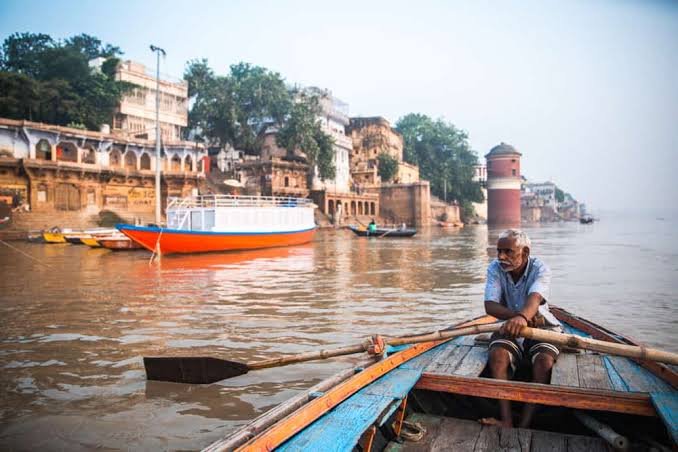
Boat excursions along the Ganges’ hallowed waters are regarded as a necessary component of the pilgrimage experience in Hinduism, where the river has enormous spiritual importance. For generations, people have observed the custom of observing the floating diyas and chanting mantras while taking a boat ride. Pilgrims are unhappy because this customary experience is being interrupted by the lack of boats.
Boatmen serve as storytellers and keepers of local history in addition to transporting passengers. Many of them add to the entire experience of tourists by sharing stories, folklore, and spiritual insights about Varanasi. The city’s cultural richness is impacted when this part of the tourism sector is lost, turning it from a profoundly spiritual experience to a simple tourist attraction.
Alternative Modes of Transportation and Government Role
Tourists are searching for other methods to see the ghats now that boat services have been suspended. Some are choosing to take walking tours, while others are attempting to see the city via road transportation and cycle rickshaws. But none of these substitutes can ever really capture the enchantment of a Ganges boat journey.
In order to resolve this problem, government intervention is essential. Talks between the government and boatmen to create just and open rules could be one way to resolve the issue. To make sure that all opinions are heard and that policies are applied fairly, authorities should think about establishing grievance redressal procedures.
Furthermore, offering impacted boatmen financial assistance or short-term job alternatives may lessen their financial strain until a solution is found. Future disputes might be avoided by providing subsidized licensing processes and making sure that administrative procedures are explained in detail.
Tomorrow’s Plans?
Both boat operators and visitors are still in a condition of uncertainty as the impasse persists. Given that approaching festivals and pilgrimage seasons will bring sizable crowds, the standoff might have a serious negative effect on Varanasi’s tourism sector if it is not resolved quickly.
The boatmen are resolved to keep protesting until their demands are fulfilled for the time being. It is unclear if the government will stick to its position or find a compromise.
Final Thoughts
The difficulties that the local boating community faces are highlighted by Varanasi’s suspension of boat services. Although safety rules are crucial, a fair strategy that protects boatmen’s livelihoods and compliance is urgently needed. The future of boat operations on the Ganges and their effect on Varanasi’s tourism sector will depend on how this dispute is resolved.
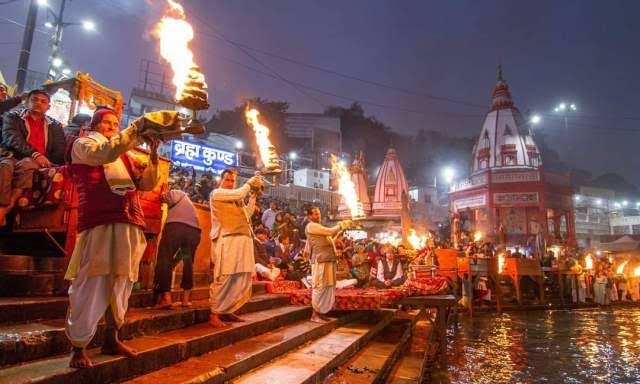
To maintain the livelihoods of the boatmen and the safety of the tourists, a just and open conclusion is essential. Until then, the famous ghats of Varanasi will remain unusually quiet, with long lines of boats lining the riverbanks, anticipating the day when they can once more set sail on the holy Ganges.

